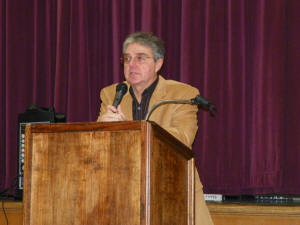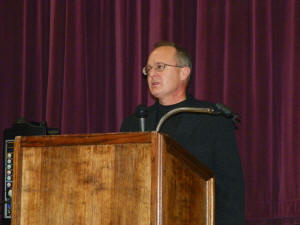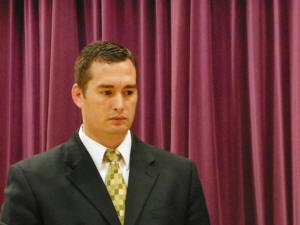|
 Approximately 30
people were present for the meeting. Approximately 30
people were present for the meeting.
This is the first of several meetings that will be put on by the
Logan County Education Cooperation Committee in order to educate
the public on the tax and hopefully gain support for their
referendum.
Though hosted by the chamber of commerce, that organization is not
taking a position on the issue. According to Andi Hake, executive director,
the chamber will remain neutral throughout this process.
Hake introduced the panel who would field questions later in
the evening. The panel consisted of Dr. Robert Kidd, board member
from District 27; Dr. Mary Ahillen, superintendent of District 27;
Lynn Warfel from Champaign County; Robert Bagby, superintendent of
Lincoln Community High School; Steven Rohrer, board member of
District 27; and Kevin Heid of First Midstate, the investment firm
that markets bonds for the school districts.

The night began with
presentations from Kidd and Ahillen, who spoke regarding the
formation of the cooperation committee and the goals they have set
with the purpose of improving the quality of education in Logan
County and doing so efficiently through cooperative efforts. 
David Hepler of the Logan County Board then delivered a PowerPoint presentation on the tax
and how it would affect schools, county
residents and the economy.
Currently nine counties in Illinois have passed sales
taxes for local schools: Jo Daviess, Knox, Warren,
Schuyler, Champaign, Macon, Cass, Lawrence and Williamson. In addition to Logan,
other counties that are working to get a referendum passed are Carroll, Shelby, Fayette, Madison and
Franklin.
Hepler said that with a 1 percent increase in taxes, Logan County
would still be in line with surrounding communities. He noted that
the tax rate in Logan is currently 7.25 percent and would rise to 8.25
percent if
the referendum passes and the county board were to approve the full
1 percent.
He noted that the tax is 8 percent in Springfield, 8.75 in
Champaign and 9 percent in Decatur.
Hepler said there has been some concern voiced that shoppers
will leave Lincoln to make their purchases, but he argued that when
you look at the tax rates in surrounding towns where many go, if
there is any savings at all, it won't be enough to make it worth the
effort. He illustrated his point using a large-ticket
item. In the case of
the purchase of a $1,500 television, the final price tag with tax
would still be comparable, with less than $10 separating the
amount of tax paid in any of the area towns.
Hepler said that passing the tax would result in better schools,
lower property taxes, more jobs and a stronger community, and the
tax would also benefit every school, from the largest to the
smallest.
"This will support every school," Hepler said. "Some schools will
get more because they are larger, others might get less, but every
school will benefit in the county. Schools like New
Holland-Middletown will get over $40,000 a year." He
put a slide on the screen that showed the breakdown of money to
individual schools, indicating that Hartsburg-Emden would receive
$103,447; Mount Pulaski, $245,781; Lincoln District 27, $592,000;
Chester-East Lincoln, $137,507; New Holland-Middletown, $42,026;
West Lincoln-Broadwell, $69,677; Lincoln Community High School,
$408,039; Illini Central in Mason County, $31,425; Warrensburg-Latham, $33,242; and Olympia High School, $141,109.
When Hepler wrapped up his presentation, the group went into
questions and answers. Audience members had been given the
opportunity to write down their questions when they came into the
meeting.
 Attorney and
chamber board member Jim Grimaldi acted as mediator,
reading the questions and directing them toward members of the
panel.
The first question asked: Will our property tax go down? Bagby
answered, saying, yes, the high school board at least had signed a
pledge that they would rebate property tax. The second question asked how Logan County residents could be
assured that the state would distribute the funds back to the
county.
[to top of second column]
 |

Warfel said he has studied the state law on this and it is constructed very well
to protect the funding and assure that it is delivered in a timely manner.
He explained that according to law, the state has 30 days to send the money back out
to the Regional Office of Education, and that office has 30 days to distribute
the funds to the individual districts.
Later in the meeting, ROE Superintendent Jean Anderson came to the podium to
explain exactly how funding is distributed to the school districts.
"There is a pretty complex formula that we have to use, based on the Fall Housing
Report for each district," she said. She explained that the report counts the students
attending a given school who also live in Logan County. Those are the students
who are included in the formula.
She used Lincoln High School as an example, saying that there are students from other
counties attending LCHS. "Some students live in Sangamon, DeWitt and Menard
County," she said. "Money does not follow them."
On the other hand, for students who live in Logan County and attend an out-of-county
school, those schools will also receive funding. She noted the Olympia district,
Warrensburg-Latham and Illini Central as schools out of the county that will
also benefit from the tax.
Another question that came up was: Are there plans to reduce the liabilities of
health care and retirement costs in our schools?
Bagby said that, speaking for the high school, in the last two years they have
eliminated two administrative positions, which has helped the school district
balance their budget. He felt like that in itself had lowered the costs in
question.
Ahillen said that in District 27, 11 certified positions and 23 noncertified
positions had been eliminated. She noted that some of those were positions where
a staff member had retired and the position was not filled.
Ahillen concluded: "I think in both of our cases (referring to LCHS and District
27), we're getting down to the bone, so we've done what we can to protect our
salaries and our benefits for our workers."
Throughout the evening, Warfel spoke up, adding information to support what was
being said by other panel members and answering questions based on the
experiences of Champaign County.
He is a proponent of the tax and said that it has given a real boost to the
schools in his county. He noted that with the funding, the schools have been
able to upgrade to high-efficiency systems, have added air conditioning to all
of the classrooms and have greatly improved the learning environment for the
students.
As the evening drew to a close, he also noted that having modern and attractive
facilities in Champaign County has helped to attract new business and industry
to the area.
"I work with economic development in Champaign County," he said. "When companies
are coming to the county, one of the first things they look at is the schools.
The schools are a reflection of us. If your schools are old and run-down with
old windows and stuff like that, economic development gets hurt. If you have
nice schools, it really has an impact."
If the 1 percent tax referendum passes in April, the next step will be approval
by the Logan County Board.
Early in the evening, Hepler noted that the passing
of the referendum offered an additional option for funding, but that the county
board would decide how to use this information.
It will be at their discretion to award a full 1 percent or a fraction of that,
whichever they deem to be the best course of action for the county.
[By NILA SMITH]
Related links



|